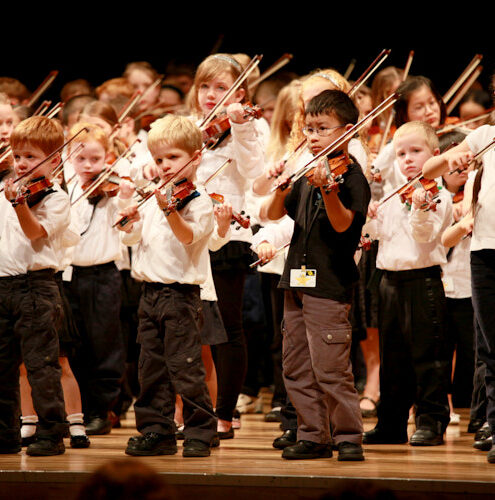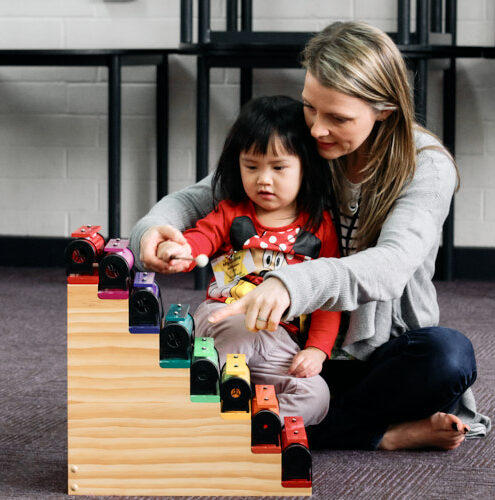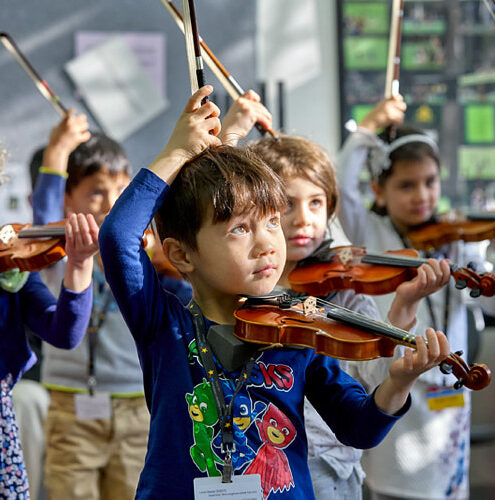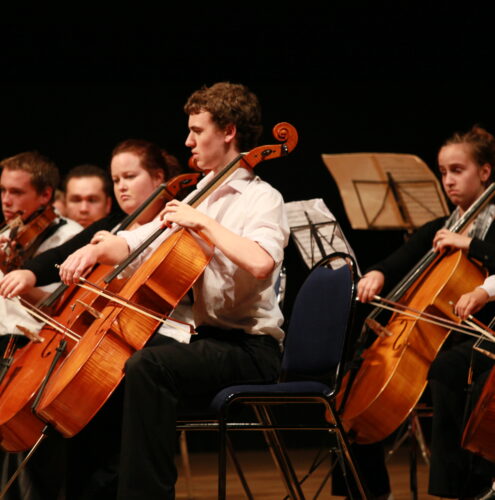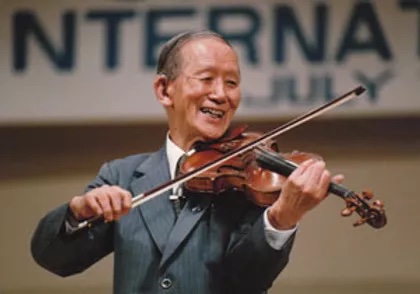
Dr Shinichi Suzuki was the founder of the worldwide music education movement known as the Suzuki Method. Born in Nagoya, Japan in 1898, he was the son of Japan’s first and largest violin manufacturer. Although he worked in the factory as a child, he had never learnt music formally.
Inspired by a recording by Mischa Elman of Ave Maria, Suzuki began to teach himself to play the violin. Over the next few years, he dedicated himself to the study of the instrument and then, at the age of 22, travelled to Berlin to study with the renowned violinist, Karl Klingler. It was here in Germany that Suzuki became a friend of Albert Einstein and through him, associated with many of the world’s leading artists and thinkers. Suzuki met and married Waltraud Prange, a concert soprano and they returned to Japan in 1928 where he began teaching and performing with the Suzuki Quartet.
Suzuki was asked by a colleague at the Imperial Conservatory to teach his young son and became stimulated to think about the ways in which children learn. Then with the outbreak of World War II, Suzuki was separated from his wife as she was classed as a foreigner. With food very scarce and conditions less than ideal, Suzuki became very ill, taking months to recover. From this experience grew a determination to positively influence the lives of children.
In Germany he had observed how easily the young children learnt to speak German, a language he was struggling to master. He also realised that all Japanese children easily learn to speak Japanese, a highly complex language. All children are able to learn their mother tongue effortlessly through listening, imitation and repetition. He concluded that children could also learn music this way, if taught with love and dedication.
Suzuki taught using the concept ‘character first, ability second’. His goal was to embrace the whole child, nurturing a love of music and the development of a fine character rather than just the mastering of a musical instrument. Suzuki called his idea ‘Talent Education’ and soon established a school in Matsumoto.
Talent Education refers to the development of skill, knowledge and character. The word ‘saino’ (talent) in the Japanese language means both ability and talent. There is no distinction between the two meanings as there can be in English. ‘Saino’ can also be used to mean the development of ability and talent in a skills area such as music and in a personal development area such as one’s character.
Suzuki took a great deal of time and care developing the repertoire, which presents technical and musical concepts in a logical sequence. Eventually other teachers heard of his work and came to Matsumoto to study. Teaching of the method then started to spread around Japan and materials were developed for cello, flute and piano.
In 1958, a film of young Suzuki children performing was shown to a group of string teachers in Ohio. The film provoked a great deal of excitement amongst the musical establishment and prompted many American teachers to learn about the method. Suzuki took a group of Japanese students to the USA to perform at a music educators conference in 1964 which continued to fuel the desire for knowledge about this amazing man and his work. Since that time, the ideas of Talent Education have spread throughout the world and have been applied to a growing range of instruments.
The Suzuki Method was introduced to Australia in the early 1970’s. Since then it has grown to encompass thousands of committed Suzuki families and teachers across all states and territories.
Dr Suzuki visited Australia five times to attend conferences. His presence always elicited much admiration and enthusiasm from those who came into contact with him, not least of all the youngest children who will remember him for the treats he kept in his pockets!
Today there are over 10,000 Suzuki teachers worldwide and hundreds of thousands of children learning by the Suzuki Method.
Dr Suzuki died aged 99 in January 1998, in Matsumoto, Japan. His profound legacy continues to influence the lives of children and their families.
Why you will love
Suzuki Music
Lauren, a Suzuki Parent
“As a music teacher who learnt the “traditional” way, I only discovered what the Suzuki Method was all about when… “Lauren, a Suzuki Parent”
Matt, a Suzuki Student
“Suzuki teaches you more than just music. It teaches valuable discipline, time management and organisational skills that transfer to all… “Matt, a Suzuki Student”
Lindy, a Suzuki Parent
”So many things I loved about Suzuki! I loved the nurturing and respectful environment of the Suzuki community. I loved… “Lindy, a Suzuki Parent”
Yuko, a Suzuki Teacher
“It’s been a great musical and personal journey with my students since I started working as a Suzuki Method Piano… “Yuko, a Suzuki Teacher”
Angelina, a Suzuki Student
“This method is not just a music program, it’s a journey to remember. The carefully crafted volumes of repertoire have… “Angelina, a Suzuki Student”
Jim, a Suzuki Parent
“My daughter has been a Suzuki music student for seven years, since she was six, and it has become a foundation… “Jim, a Suzuki Parent”
Vicky, a Suzuki Parent
“A few years down the track of our Suzuki journey, it has become an integral part of our family life.… “Vicky, a Suzuki Parent”
Hanna, a Suzuki Teacher
“I’m in a special place to love the Suzuki method, as I both learned Suzuki piano from age 3 myself,… “Hanna, a Suzuki Teacher”
Haipei, a Suzuki Parent
“Our family loves Suzuki Events. It’s always fun because everyone plays the same piece together in a fun way. Instead… “Haipei, a Suzuki Parent”
Chloe, a Suzuki Student
“The first time that I heard piano was when I was a little four-year-old girl, listening to my friend play… “Chloe, a Suzuki Student”
Terrence, a Suzuki Student
“I have been learning piano with Suzuki Music since I was 3 years old. Suzuki recommends starting from a young… “Terrence, a Suzuki Student”
Crystal, a Suzuki Parent
“I feel very blessed to have Suzuki offer my daughters such a wonderful musical education! I think that I was… “Crystal, a Suzuki Parent”
Merry, a Suzuki Parent
“My journey as a parent with Suzuki Music has been fantastic. My two sons started learning piano at a very… “Merry, a Suzuki Parent”
Jason, a Suzuki Parent
“Our Family joined Suzuki Music in 2019. Firstly, based on our experiences, Suzuki not only provided our daughters a systematic… “Jason, a Suzuki Parent”

